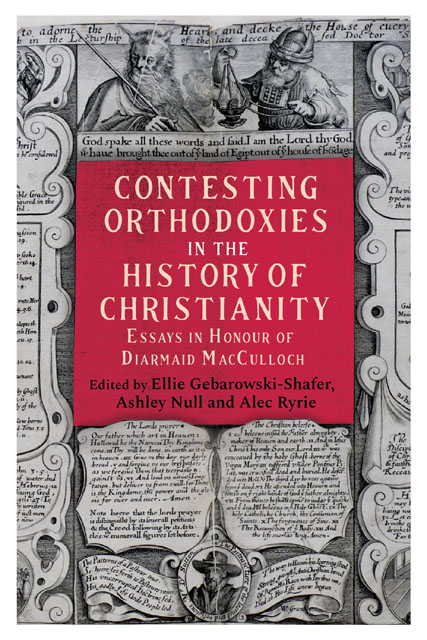Book contents
- Frontmatter
- Contents
- List of Illustrations
- List of Contributors
- List of Abbreviations
- Introduction
- 1 ‘Jewish Christianity’ in Antiquity: Meaningless Category or Heuristic Irritant?
- 2 ‘Sola Fide’: the Wrong Slogan?
- 3 Both Cromwellian and Augustinian: the Influence of Thomas Cromwell on Reform within the Early Modern English Austin Friars
- 4 Lex, Rex and Sex: The Bigamy of Philipp of Hesse and the Lutheran Recourse to Natural Law
- 5 The Authority of Scripture in Reformation Anglicanism: Then and Now
- 6 Orthodoxy and Heresy in the Post-Reformation
- 7 Profanity and Piety in the Church Porch: the Place of Transgression in Early Modern England
- 8 Writing on the Walls: Word and Image in the Post-Reformation English Church
- 9 The Myth of the Church of England
- 10 Mysticism, Orthodoxy and Reformed Identity before the English Revolution: the Case of John Everard
- 11 Sacrilege and the Sacred in England’s Second Reformation, 1640–1660
- 12 ‘I had not the patience to be quiet’: Arthur Bury and The Naked Gospel
- 13 ‘A soul-corrupting indifferentism’: the Intellectual Development of Benjamin Henry Latrobe
- 14 Newman, Dogma and Freedom in the Church
- 15 ‘Tommy, ’ow’s yer soul?’ Reconsidering Religion and the British Soldier
- 16 The King James Vulgate
- 17 The Myth of the Anglican Communion?
- Select bibliography of Diarmaid MacCulloch’s scholarly publications
- Bibliography
- Index
- Tabula Gratulatoria
- Studies in Modern British Religious History
13 - ‘A soul-corrupting indifferentism’: the Intellectual Development of Benjamin Henry Latrobe
Published online by Cambridge University Press: 09 January 2024
- Frontmatter
- Contents
- List of Illustrations
- List of Contributors
- List of Abbreviations
- Introduction
- 1 ‘Jewish Christianity’ in Antiquity: Meaningless Category or Heuristic Irritant?
- 2 ‘Sola Fide’: the Wrong Slogan?
- 3 Both Cromwellian and Augustinian: the Influence of Thomas Cromwell on Reform within the Early Modern English Austin Friars
- 4 Lex, Rex and Sex: The Bigamy of Philipp of Hesse and the Lutheran Recourse to Natural Law
- 5 The Authority of Scripture in Reformation Anglicanism: Then and Now
- 6 Orthodoxy and Heresy in the Post-Reformation
- 7 Profanity and Piety in the Church Porch: the Place of Transgression in Early Modern England
- 8 Writing on the Walls: Word and Image in the Post-Reformation English Church
- 9 The Myth of the Church of England
- 10 Mysticism, Orthodoxy and Reformed Identity before the English Revolution: the Case of John Everard
- 11 Sacrilege and the Sacred in England’s Second Reformation, 1640–1660
- 12 ‘I had not the patience to be quiet’: Arthur Bury and The Naked Gospel
- 13 ‘A soul-corrupting indifferentism’: the Intellectual Development of Benjamin Henry Latrobe
- 14 Newman, Dogma and Freedom in the Church
- 15 ‘Tommy, ’ow’s yer soul?’ Reconsidering Religion and the British Soldier
- 16 The King James Vulgate
- 17 The Myth of the Anglican Communion?
- Select bibliography of Diarmaid MacCulloch’s scholarly publications
- Bibliography
- Index
- Tabula Gratulatoria
- Studies in Modern British Religious History
Summary
Orthodoxies can live only if they are taught, and if they are passed down from generation to generation: but that process can be fraught. When the younger generation are caught up in an exciting new movement such as Enlightenment philosophy, their priorities – the very questions they ask, never mind the answers they reach – can twist out of their parents’ anguished reach. This essay lays bare the intergenerational agonies of a leading family of late eighteenth-century English Moravians, detailing how the son of one of the denomination’s senior leaders came to question and challenge the orthodoxies in which he was raised, with painful consequences for all concerned. The rigours of the Moravians’ educational structures were designed to preserve orthodox teachings and piety for the next generation, even as the ferment of Enlightenment philosophy put those teachings under unprecedented pressure. Those who taught Benjamin Latrobe the younger borrowed the methods of Enlightenment philosophy and science but shied away from the difficult questions those methods posed; the result was ultimately his loss to the community and his reinvention of himself in the new United States as an architect and thinker.
The year 1783 was troubling for the most senior leader of the Moravian Church in Britain. Benjamin LaTrobe held the office of provincial labourer in the church’s British province, a position which placed him in spiritual authority over the entire ecclesial province and directly under the authority of the church’s international governing body, the Unity Elders’ Conference (UEC), headquartered in Germany. As provincial labourer, LaTrobe spent much of his time travelling with his wife, Anna, throughout the British Isles on visits to established congregations and to missionary locations. The rest of his time he spent at the provincial headquarters at Fetter Lane in London. But wherever he was located, his role required addressing weighty and emotionally taxing pastoral concerns within the church, usually regarding people outside his own family. However, 1783 was different.
Late at night on 22 April, LaTrobe received a letter with the words zur eignen eröfnung written across the back – for your eyes only. ‘My heart,’ he later commented, ‘failed me and my hand trembled and I put it in my pocket, as I would not distress my wife who is very ill of a cold and prevent her and myself some sleep.’ After a few restless hours LaTrobe ‘could sleep no more’.
- Type
- Chapter
- Information
- Contesting Orthodoxies in the History of ChristianityEssays in Honour of Diarmaid MacCulloch, pp. 219 - 237Publisher: Boydell & BrewerPrint publication year: 2021



